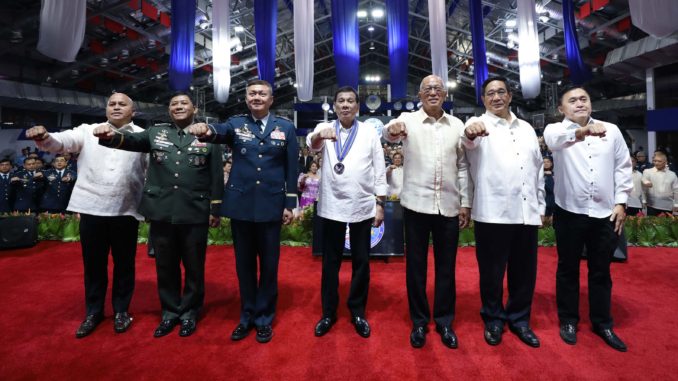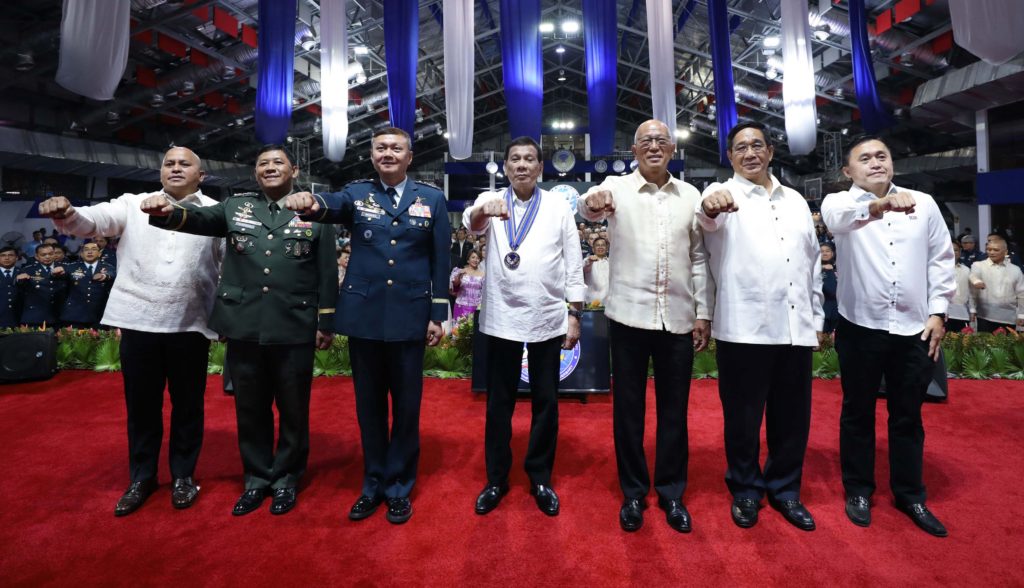
In his first three years, President Duterte passed measures that are populist, pro-poor, or both.
The measures include free college education, universal health care, free irrigation and the expanded conditional cash transfer program. He also doubled the salaries of policemen and soldiers and promised a similar pay hike for some 830,000 state teachers.
The middle class, meanwhile, will remember Duterte for laws on expanded maternity leave (105 days), greater access to mental health care and HIV/AIDS support.
Non-smokers are rejoicing over the nationwide ban on cigarette smoking in public places. The ban covers vaporizers and other e-cigarettes.
On universal health care, outgoing Speaker Gloria Macapagal Arroyo said, “this means that every Filipino will be enjoying their right to have health assistance by becoming part of the National Health Insurance Program. Forms of assistance include preventive, promotive, curative, rehabilitative, and palliative care for medical, dental, mental, and emergency health services.”
Duterte also ordered free wi-fi in public places. To cut red tape, he signed the Ease of Doing Business Act, improving on the Anti-Red Tape Act.
“At midpoint, there is much to celebrate but there are also larger goals that we yet have to accomplish. President Rodrigo Duterte enjoys broad and profound support from our people. They appreciate the sincerity, the hard work and the visionary strategy of this administration,” said Finance Secretary Carlos Dominguez, the leader of Duterte’s economic team which designed Dutertenomics.
“The whole idea of Dutertenomics was that a rapid expansion of state capacity both financial and political to thrust the economy on a higher growth trajectory. This should create mass middle class and lift five million families over the poverty hurdle,” explains economist Joey Salceda, congressman of the second district of Albay.
Build Build Build
The Philippines projects a rise in infra spending from P858 billion in 2017 to P1.84 trillion, or from 5.4% of GDP to 7.3% of GDP. The Dutertenomics model would have simulated impact of 9%-10%, much higher than the current official forecasts, figures Salceda.
The massive infra program is projected to contribute 5.5% of the 7.5% growth rate projected in 2022.
“Indeed there is a single-mindedness in the economic team to execute the Build Build Build strategy with projects under construction rising from P1 billion in 2017 to P40 billion in 2019, and projects with financial close rising from P126 billion to P992 billion and projects under procurement from P115 billion to P531 billion,” says Salceda.
Strong grip

Salceda says, “the President has a strong grip on his Cabinet which has consistently spoken in a unified voice on issues and no open public acrimonious debate among departments of policy differences have surfaced.”
One unique feature of Duterte’s management style, has been to appoint retired generals to key positions possibly because they are trained to strictly follow, notes the Albay solon, command and no second-guessing of the superior’s preference.
And even the Congress has provided robust legislative support with the House approving all 25 items in the presidential plate although Senate delivered only six.
Indeed, “no other President has enjoyed sustained mass popularity since EDSA, and at par with Ramon Magsaysay’s,” recalls Salceda.
Meanwhile, Dominguez says “the economic managers have formulated a bold catch-up program to achieve a GDP growth rate of over 6% this year.”
“We will accelerate infrastructure disbursements and hasten implementation of projects so that public works spending hits the targeted 5.2% of GDP by the end of the year. We will fast-track the implementation of priority socioeconomic programs. We aim to bring up the growth of our agriculture sector to at least 2% per annum. We look forward to working closely with Congress to continue improving the ease of doing business.”
Rice
The Rice Tariffication Act has made quality rice more affordable and accessible to Filipino consumers, thereby bringing down inflation. In fact, rice retail prices are now cheaper by P5 to P10 per kilo compared to last year, reports Dominguez.
Moving forward, DOF Chief Dominguez says “the passage of the TRABAHO bill will encourage even more competitive investments to enter our economy. The reduction of corporate income tax rates will bring our tax regime closer to the regional average and the rationalization of fiscal incentives will create a level playing field for our enterprises and attract new players to compete.”
Dominguez reports:
“Reforms are also being introduced to improve efficiency and accountability.”
“The Department of Interior and Local Government, for instance, has streamlined local government processes through the increased use of modern digital technologies.”
“The Department of Trade and Industry, headed by Ramon Lopez, is doing its part in reengineering the processes of starting a business through Project One.”
“We will now have a One Central Business Portal that will be available online and through mobile phone, transforming the business registration experience into a convenient facility that is available 24 hours a day, 7 days a week, including Sundays and holidays. These reforms will greatly enhance the ease of doing business,” says Dominguez.
“Our people are beginning to reap the rewards from a well-managed economy. Unemployment is at its lowest in 40 years. From an average of 6.9% in 2010 to 2015, the unemployment rate has averaged 5.5% from 2016 to 2018. The latest data for April 2019 showed unemployment has dipped further to 5.2%.”
“The drop in the unemployment rate reflects in the reduction of poverty incidence. From 27.6% in the first half of 2015, poverty incidence has significantly declined to 21% in the first half of 2018.”
“The decline in poverty incidence indicated by official figures is confirmed by opinion surveys that measure self-rated poverty. A recent SWS poll showed that the number of Filipinos who consider themselves poor fell to 38%, the lowest number ever.”
5 MINUTES TO NIRVANA
At Monday’s (July 1, 2019) forum designed as a precursor to President Rodrigo Duterte’s State of the Nation Address (SONA) on July 22, two key cabinet members painted or promised nirvana for the Filipino people.
Finance Secretary Carlos “Sonny” Dominguez maintained that TRAIN (Tax Reform for Acceleration and Inclusion), which is basically a tax package more than a tax relief, was actually endorsed by the Filipino electorate during the May 13, 2019 elections.
Ten of Duterte’s candidates won 10 of 12 senatorial slots at stake. At the same time, the President’s allies and candidates of the coalition, either cobbled by his PDP-Laban party, or his daughter Sara’s Hugpong ng Pagbabago, swept most of the local LGU and congressional seats contested, giving the administration huge political capital over the next three years.
“The election victories of proponents and supporters in Congress of the Tax Reform for Acceleration and Inclusion (TRAIN) law showed support, not opposition to, the administration’s tax reforms,” Dominguez said, as reported by the Inquirer.
For his part, Public Works Secretary Mark Villar claimed Duterte’s P9-trillion Build, Build, Build infra program involving 75 projects is being accelerated and that it is actually do-able to travel from Makati to Cubao by yearend, in five minutes.
None of the eight opposition senatorial candidates under the Liberal Party’s Otso Diretso won. Former President BS Aquino III’s first cousin, reelectionist Senator Bam Aquino, and his (Noynoy’s) best friend, with whom he shared girl friends, comebacking former Senator Mar Roxas, were among the big opposition losers.
As a result, there are now only four LP opposition senators in the 24-member Senate and only 18 LP congressmen in a Lower House of 354 members. The four LP senators are: Frank Drilon, Francis Pangilinan, Risa Hontiveros, and Leila de Lima (detained).
Dominguez promised more food at stable prices, a slower rate of rise (or inflation) in prices of commodities, cheaper money for lending because of the country’s investment-grade rating (BBB+ stable, the best in 100 years); greater spending by the government (for education, for health, for policemen and soldiers, for social pension, for agriculture, or as a ratio of GDP, 19%, the highest in 28 years); a simplier, fairer, and more efficient tax regime (simply stated, you will pay more and higher taxes, such as those imposed on diesel and other refined petroleum products, coffee, orange and other sweet juices, liquor and cigarets, autos, and services offered by Dr. Vicky Belo, and increased fees rendered by government corporations which are required to hike dividends paid their owner, the government); start of the $935-million Metro Manila Subway funded by Japan), full operations of the Clark Airport City within a year; more cheap foreign loans, more foreign investments, tax breaks for big corporations (but of course); easier ways of doing business (wow!), more efficient and more accountable government (wow!!!), lower unemployment rate (at 5.17% in April 2019, a triple wow); lower poverty incidence (to 21% of the population in first half 2018 from 27.6% in first half 2015, a wow, wow, wow, wow! because that means five million Filipinos uplifted).
“We expect to perform even better in the coming period by rapidly modernizing not only our infrastructure base but also the policy architecture that will make possible sustained and inclusive growth,” proclaimed Dominguez.
Meanwhile, Villar said that the five-minute travel time from Cubao in Quezon City to Makati City is doable.
In an off-the-cuff remark last June 8, 2019, Duterte promised a five-minute travel time from Makati to Cubao, on EDSA by December this year.
“You just wait. Ayaw kong mag-ano. Things will improve. Maybe God willing December smooth sailing na,” Duterte said in a television interview over Sonshine Media Network. “You don’t have to worry about traffic. Cubao and Makati is just about five minutes na lang.”
“It (five minutes) is actually possible,” Villar said, clearly not sounding like Pollyanna.
Once major road projects around Metro Manila are completed, a 15-minute travel time between Makati and Balintawak is possible, making it quite possible for the five-minute travel time from Cubao to Makati, explained Villar.
Duterte and Mark Villar might be referring to the 14.82-km elevated Magallanes (Makati)-Balintawak connector road of San Miguel Corp. which is due for completion next year (December is one month before next year).
Running at 60 kph on an elevated expressway like the SMC connector road, a car can reach Balintawak from Makati in just 15 minutes. Balintawak to Cubao is 9.8 kms. Subtract 9.8 kms from 14.82 kms, you get five kms. At 60 kph, five kms is just five minutes. Duterte surely knows his math.
— Tony Lopez
